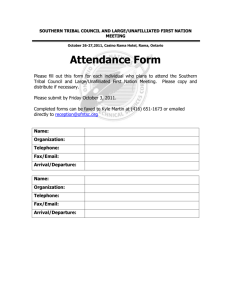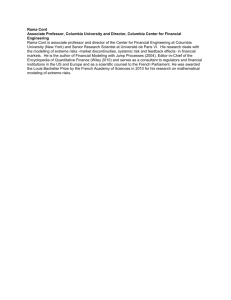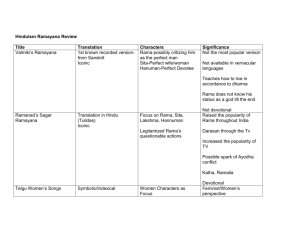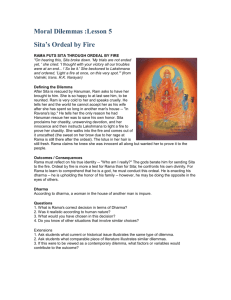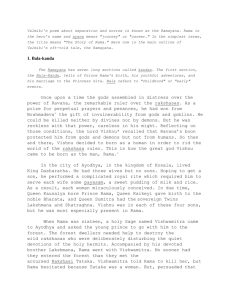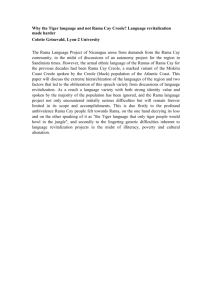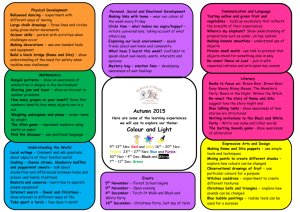Valmiki Ramayana – Aranya Kanda – Chapter 12 Rama and the
advertisement
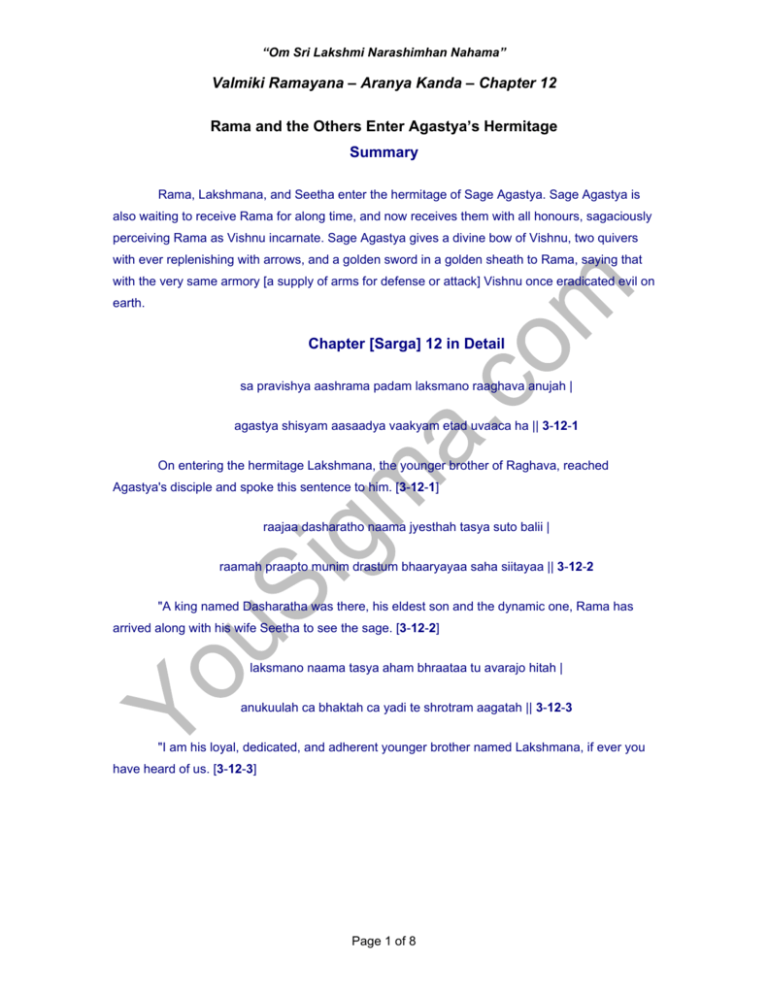
“Om Sri Lakshmi Narashimhan Nahama” Valmiki Ramayana – Aranya Kanda – Chapter 12 Rama and the Others Enter Agastya’s Hermitage Summary Rama, Lakshmana, and Seetha enter the hermitage of Sage Agastya. Sage Agastya is also waiting to receive Rama for along time, and now receives them with all honours, sagaciously perceiving Rama as Vishnu incarnate. Sage Agastya gives a divine bow of Vishnu, two quivers with ever replenishing with arrows, and a golden sword in a golden sheath to Rama, saying that with the very same armory [a supply of arms for defense or attack] Vishnu once eradicated evil on earth. Chapter [Sarga] 12 in Detail sa pravishya aashrama padam laksmano raaghava anujah | agastya shisyam aasaadya vaakyam etad uvaaca ha || 3-12-1 On entering the hermitage Lakshmana, the younger brother of Raghava, reached Agastya's disciple and spoke this sentence to him. [3-12-1] raajaa dasharatho naama jyesthah tasya suto balii | raamah praapto munim drastum bhaaryayaa saha siitayaa || 3-12-2 "A king named Dasharatha was there, his eldest son and the dynamic one, Rama has arrived along with his wife Seetha to see the sage. [3-12-2] laksmano naama tasya aham bhraataa tu avarajo hitah | anukuulah ca bhaktah ca yadi te shrotram aagatah || 3-12-3 "I am his loyal, dedicated, and adherent younger brother named Lakshmana, if ever you have heard of us. [3-12-3] Page 1 of 8 “Om Sri Lakshmi Narashimhan Nahama” Valmiki Ramayana – Aranya Kanda – Chapter 12 te vayam vanam atyugram pravistaah pitri shaasanaat | drastum icchaamahe sarve bhagavantam nivedyataam || 3-12-4 "Such as we are, we entered the awful forest at the decree of our father, and we wish to see the godly sage, let this be informed to him." Said Lakshmana to the disciple of Agastya. [312-4] tasya tad vacanam shrutvaa laksmanasya tapodhanah | tathaa iti uktvaa agni sharanam pravivesha niveditum || 3-12-5 On hearing that sentence of Lakshmana that disciple who is ascetically rich replied 'agreed, ' and he entered the sanctum of Ritual-fire to submit the same to Agastya. [3-12-5] sa pravishya munishrestham tapasaa dus.hpradharsanam | krita a.njalih uvaaca idam raama aagamanam anjasaa || 3-12-6 yathaa uktam laxmanena eva shisyah tasya agastasya sa.mmatah | He that agreeable disciple of sage quickly approached the irrefutable sage by his asceticism, made palm-fold and said this to the eminent sage about the arrival of Rama, exactly as said by Lakshmana. [3-12-6, 7a] putrau dasharathasya imau raamo laksmana eva ca || 3-12-7 pravistau aashramapadam siitayaa saha bhaaryayaa | "Sons of King Dasharatha, Rama and also thus Lakshmana have entered the threshold of hermitage along with the wife of Rama, namely Seetha. [3-12-7b, 8a] drastum bhavantam aayaatau shushruusaartham arindamau || 3-12-8 yad atra ana.ntaram tat tvam aajnaapayitum arhasi | "Those two enemy-destroyers have come cherishing to see and serve you; hence it will be apt of you to order what next is to be done in this regard." Said disciple to the sage. [3-12-8b, 9a] Page 2 of 8 “Om Sri Lakshmi Narashimhan Nahama” Valmiki Ramayana – Aranya Kanda – Chapter 12 tatah shisyaat upashrutya praaptam raamam sa laksmanam || 3-12-9 vaidehiim ca mahaabhaagaam idam vacanam abraviit | Having heard from the disciple that Rama has arrived with Lakshmana and with highly fortunate Seetha the sage said this to him. [3-12-9b, 10a] distyaa raamah cirasya adya drastum maam samupaagatah || 3-12-10 manasaa kaa.nksitam hi asya mayaa api aagamanam prati | "My heart is indeed yearning for his arrival, and after this long a time Rama providentially came to see me." [3-12-10b, 11a] gamyataam satkrito raamah sa bhaaryah saha laksmanah || 3-12-11 praveshyataam samiipam me kim asau na praveshitah | "Go forth and make welcome to Rama, Lakshmana and to Seetha, and they be entered here, why you have not invited them as yet? [3-12-11b, 12a] evam uktah tu muninaa dharmajnena mahaatmanaa || 3-12-12 abhivaadya abraviit shisyah tathaa iti niyata a.njalih | Thus said by the great-souled sage and the knower of virtue, the disciple adored him with palm-fold saying that "as you say." [3-12-12b, 13a] tadaa nis.hkramya sa.mbhraantah shisyo laksmanam abraviit || 3-12-13 kva asau raamo munim drastum etu pravishatu svayam | Then that disciple went out with a little perplexity and said this to Lakshmana, "Where is this Rama? He may come to see the sage and let him enter hermitage on his own." Said that disciple to Lakshmana. [3-12-13b, 14a] Page 3 of 8 “Om Sri Lakshmi Narashimhan Nahama” Valmiki Ramayana – Aranya Kanda – Chapter 12 tato gatvaa aashrama padam shisyena saha laksmanah || 3-12-14 darshayaamaasa kaakutstham siitaam ca janakaatmajaam | Then on going out to the exterior of that hermitage along with that disciple, Lakshmana has shown him Rama and Janaka's daughter Seetha. [3-12-14b, 15a] tam shisyah prashritam vaakyam agastya vacanam bruvan || 3-12-15 praaveshayat yathaa nyaayam satkaara arha susatkritam | While that disciple repeated the obliging words of Agastya entered that receptionworthy Rama into hermitage on receiving him well. [3-12-15b, 16a] pravivesha tato raamah siitayaa saha laksmanah || 3-12-16 prashaanta harina aakiirnam aashramam hi avalokayan | And then Rama entered the hermitage with Seetha and Lakshmana looking over it which is overspread with docile deer. [ 3-12-16b, 17a] sa tatra brahmanah sthaanam agneh sthaanam tathaiva ca || 3-12-17 visnoh sthaanam mahendrasya sthaanam caiva vivasvatah | soma sthaanam bhaga sthaanam sthaanam kauberam eva ca || 3-12-18 dhaatur vidhaatuh sthaanam ca vaayoh sthaanam tathaiva ca | sthaanam ca paasha hastasya vaarunasya mahaatmanah || 3-12-19 sthaanam tathaiva gaayatryaa vasuunaam sthaanam eva ca | sthaanam ca naagaraajasya garuda sthaanam eva ca || 3-12-20 kaartikeyasya ca sthaanam dharma sthaanam ca pashyati | Rama entered inside the hermitage and saw therein the Sanctus [opening of a song of praise to God] of Brahma, Fire-god, Vishnu, Indra, Vivasvat - the Sun-god, Soma - the Moon-god, Bhaga - one among the twelve Suns, and the sanctums of Kubera, [Wealth-Management-god, are seen and passed by the three of them, sanctums of Dhaata, Vidhaata - Vedic deities created by Brahma to help Svayambhuu Manu, sanctum of Vayu - the Air-god, and also like that the sanctum of great-soloed Varuna - the Rain-god who also wields noose, and the sanctum of Gayatri - the presiding deity of gnosis, sanctum of Vasu’s - eight of them, and the sanctum of cobra's king - aadi shesha, the divine Thousand-headed serpent that bears this globe on its head, and on which Vishnu reclines, and even the sanctum of Garuda - the Divine Eagle and the vehicle of Vishnu, and the half brother of aadi shesha, and the sanctum of Kaarthikeya - chief of gods army, second son of Shiva, and the sanctum of Dharma - Dharmaraaja, presiding deity of Virtue-Vice-Time of living beings, in-charge of the hell. [17b, 18, 19, 20, 21a] Page 4 of 8 “Om Sri Lakshmi Narashimhan Nahama” Valmiki Ramayana – Aranya Kanda – Chapter 12 tatah shisyaih parivrito munir api abhinispatat || 3-12-21 tam dadarsha agrato raamo muniinaam diipta tejasam | Then encircled by disciples the sage Agastya came out quickly, and Rama saw him who is glowing brilliant before all the other sages. [3-12-21b, 22a] abraviit vacanam viiro laksmanam laksmivardhanam || 3-12-22 bahir laksmana niskraamati agastyo bhagavaan risih | audaaryena avagacchaami nidhaanam tapasaam imam || 3-12-23 On seeing the brilliantly glowing sage among those sages, he that bold Rama said this sentence to Lakshmana, the fortifier of fortune, "Here comes the godly sage, Lakshmana, by his eminence I comprehend him as a depository of all ascesis." [3-12-22b, 23] evam uktvaa mahaabaahuh agastyam suurya varcasam | jagraaha aapatat tasya paadau ca raghunandana || 3-12-24 That dexterous Rama on saying about that sun-like radiant sage Agastya, he that descendent of Raghu fell on the feet of Agastya touching them reverentially. [3-12-24] abhivaadya tu dharmaatmaa tasthau raamah kritaa.njalih | siitayaa saha vaidehyaa tadaa raamah sa laksmanah || 3-12-25 Then he who is a delight to the on lookers that noble-hearted Rama on revering the sage along with Lakshmana and Seetha, the princess from Videha, stood aside with his palms adjoined. [3-12-25] pratigrihya ca kaakutstham arcayitvaa aasana udakaih | kushala prashnam uktvaa ca aasyataam iti so.abraviit || 3-12-26 Offering seat and water that sage received Rama, and even on exchanging pleasantries that sage said to him, "please be seated." [3-12-26] Page 5 of 8 “Om Sri Lakshmi Narashimhan Nahama” Valmiki Ramayana – Aranya Kanda – Chapter 12 agnim hutvaa pradaaya arghyam atithin pratipuujya ca | vaanaprasthena dharmena sa tesaam bhojanam dadau || 3-12-27 Having completed his personal worship to Fire-god, and having offered water and other formalities to guest, that sage gave viands to guests according to his hermitic observances. [3-1227] prathamam ca upavishya atha dharmajno munipu.mgavah | uvaaca raamam aasiinam praa.njalim dharmakovidam || 3-12-28 Then that eminent and shrewd sage Agastya in righteousness took his seat at the outset, and spoke to prudent Rama of righteousness itself, and who by now is sitting with his palms adjoined. [3-12-28] agnim hutvaa pradaaya arghyam atithim pratipuujayet | anyathaa khalu kaakutstha tapasvii samudaacaran | duhsaaksii iva pare loke svaani maa.msaani bhaksayet || 3-12-29 "Worshipping the fire, giving water and worshipping the guest a hermit should receive a guest and feed him, and if a hermit practices contrarily, oh, Rama, he is destined to eat his own flesh like a false deponent in other world say, hell. [3-12-29] raajaa sarvasya lokasya dharmacaarii mahaarathah | puujaniiyah ca maanyah ca bhavaan praaptah priya atithih || 3-12-30 "You are the king of the entire world, the treader [to walk or proceed along] in the path of righteousness, great charioteer of probity, and you are the venerable and estimable one, and you have arrived as my dear guest. [3-12-30] evam uktvaa phalaih muulaih puspaih ca anyaih ca raaghavam | puujayitvaa yathaa kaamam tato agastyah tam abraviit || 3-12-31 Saying thus, Agastya adored Raghava well with fruits, tubers, flowers and others according to his ardency, and then he said this to Rama. [3-12-31] Page 6 of 8 “Om Sri Lakshmi Narashimhan Nahama” Valmiki Ramayana – Aranya Kanda – Chapter 12 idam divyam mahat caapam hema vajra vibhuusitam | vaisnavam purusavyaaghra nirmitam vishvakarmanaa || 3-12-32 amoghah suurya sa.mkaasho brahmadattah shara uttamah | "This sacred bow that is decorated with gold and diamonds is crafted by the divine architect Vishvakarma pertains to Vishnu, and these un-wasteful arrows equaling sun in their blaze are the gift of Brahma. [3-12-32, 33a] datto mama mahendrena tuunii ca aksaya saayakau || 3-12-33 sa.mpuurnau nishitaih baanaih jvaladbhih iva paavakaih | mahaa rajata kosho ayam asih hemavibhuusitah || 3-12-34 "Also these two inexhaustible quivers packed with arrows that have the blaze of Ritualfire, and this sword decorated in gold together with its sheath made up of excellent golden are once given to me by Indra. [3-12-33b, 34] anena dhanusaa raama hatvaa sa.mkhye mahaasuraan | aajahaara shriyam diiptaam puraa visnur diva okasaam || 3-12-35 "By this bow, oh, Rama, once Vishnu eliminated horrible demons in war and brought back radiant prosperity to the celestials. [3-12-35] tat dhanuh tau ca tuuni ca sharam khadgam ca maanada | jayaaya pratigrihniisva vajram vajradharo yathaa || 3-12-36 "The bow, these two quivers, arrows, and the sword, oh, Rama, the endower of grace, receive and wield them to triumph over the demons as Indra would wield Thunderbolt. [3-12-36] evam uktvaa mahaa tejaah samastam tat vara aayudham | dattvaa raamaaya bhagavaan agastyah punar abraviit || 3-12-37 On saying thus that great resplendent and godly sage Agastya, gave all of those best weapons to Rama, and again spoke to Rama [3-12-37] Page 7 of 8 “Om Sri Lakshmi Narashimhan Nahama” Valmiki Ramayana – Aranya Kanda – Chapter 12 iti vaalmiiki raamaayane aadi kaavye aranya kaande dvaadashah sargah Thus, this is the 12th chapter in Aranya Kanda of Valmiki Ramayana, the First Epic poem of India. Sriman Moola Rama Vijayate References Desiraju Hanumanta Rao. (1998). Aranya Kanda - Forest track. Merriam-Webster. (2007). At http://www.m-w.com. Reference.com. (2007). At http://www.reference.com. Page 8 of 8
